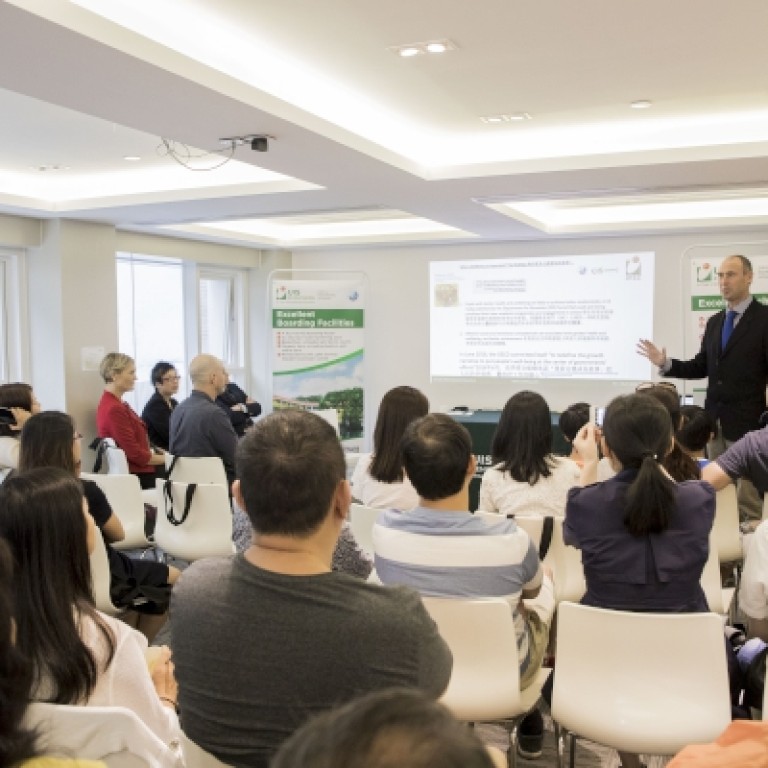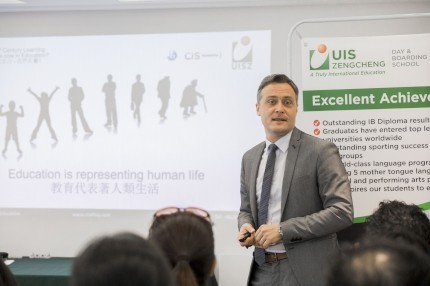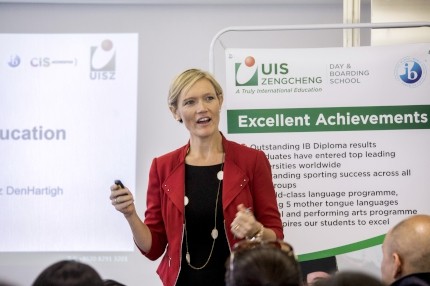
UISZ Day & Boarding School nurtures students' whole-person development and promotes wellbeing
[Sponsored article] Breaking the mould of exam-driven education that stifles children’s creativity and curiosity, Utahloy International School Zengcheng Day & Boarding School (UISZ) adopts the International Baccalaureate (IB) curricula for its primary and secondary schools integrated with comprehensive whole-person development programmes that aim to promote students’ lifelong mental and physical wellbeing.
[Sponsored article]
Breaking the mould of exam-driven education that stifles children’s creativity and curiosity, Utahloy International School Zengcheng Day & Boarding School (UISZ) adopts the International Baccalaureate (IB) curricula for its primary and secondary schools integrated with comprehensive whole-person development programmes that aim to promote students’ lifelong mental and physical wellbeing.
Recent studies highlight the strong correlation between ‘wellbeing’ and ‘effective learning’. Happy children tend to be good learners. “They are engaged in their environment so that they learn better,” says Nicholas Evans, UISZ Head of School. “Wellbeing is also about being active. In the school’s “INSPIRE” Boarding programme, an immersive whole-person development model, the students are educated physically, academically, emotionally and socially. This cultivates wellbeing.”


Located in the Zengcheng district of Guangzhou City, Guangdong Province, China, the campus of UISZ is inside an 85-hectre botanical garden, surrounded by expansive open green spaces, complete with a full range of sports facilities, Olympic sized swimming pool, art and drama studios, and a lake. The campus is around 40 minutes to Dongguan and two hours to Hong Kong. The school also has a site in Sai Kung for outdoor education activities and experiential learning.
UISZ offers three programmes from Year 1 to 12 based on the IB curricular framework: Primary Years Programme (PYP, Year 1 to 6); Middle Years Programme (MYP, Year 7 to 10) and IB Diploma (IBDP, Years 11 and 12). The student is at the centre of these programmes, with a well being curriculum delivered alongside the IB programmes for students’ holistic development.
In UISZ’s Vertical House System, students of different ages are grouped together which optimises their interaction with one another, Evans notes. “Under the guidance of Heads of House, the older students are designated as house captains and tasked with watching the behaviours of the younger students. Apart from developing students’ leadership skills, this system nurtures their sense of responsibility, empathy and understanding. By mixing students of different ages, the younger ones can learn from the seniors, while the seniors see where the juniors need help. This creates a caring environment where students share strong bonds and respect for all.”
UISZ’s Counsellor and Welfare Coordinator, Gavin Fuller, echoes Evans’ sentiment, adding that there is a strong correlation of students’ sense of security to outstanding academic achievements. “Students feel safe and secure because the school ensures they are well looked after and supported. The keys to success include mindfulness and being active and engaged to the community, nature and technology. UISZ’s programmes tap into these elements.”
Wellbeing for students and staff is featured in the programme standards and practices section of the IB school authorisation process, according to Evans. “This is a requirement, butut UISZ has taken it further. We have a well-articulated comprehensive wellbeing programme for which we received a commendation in last year’s IB evaluation.”
Given its student body consisting of individuals from many nationalities, the school recognises differences and embraces diversity. “We see that children are different from one another. Each one is unique,” Evans says. When each student’s unique qualities are recognised and embraced, they feel accepted and this feeling contributes to their wellbeing.
21st century education
At UISZ, students are encouraged to explore their interests so that their curiosity is stimulated. Curiosity is key to effective learning because when children are curious, they are self-motivated to learn. Meanwhile, UISZ places equal emphasis on science, mathematics, arts and humanities. “All these go into an individual’s creativity, making us diverse and dynamic,” Evans says.
The IB curriculum aims to stimulate curiosity, encourage creativity and promote students’ intellectual dexterity. Over 4,000 schools worldwide have adopted IB frameworks and the number is growing. UISZ Head of Primary, Elizabeth DenHartigh, says IB features a framework and goal-driven classes in which teachers and students bring in their creativity. In the PYP, the teaching and learning are transdisciplinary and students are encouraged to ask questions.”They will go beyond what they normally do in a regular classroom. The students will feel confident to try something new. In the MYP, the education will introduce more academic elements that seek to make students life-long learners. They develop their critical thinking skills and are encouraged to take reflective action: they learn something and apply the knowledge by trying out something new. They also learn to become global citizens,” she notes. “The IBDP features rigorous, broad and flexible academic teaching. The students are trained to become critical thinkers and researchers, getting themselves ready for university education.”


In essence, inquiry is one of the key components of IB education. It starts from structured inquiry, to the intermediary level of controlled and guided inquiry, then moves on to the advanced level of free inquiry. The other components are global-mindedness and intercultural awareness. The students acquire a sound understanding of their own and others’ cultures when they develop their skills, attitudes and knowledge. UISZ incorporates global perspectives in its curricula that promote tolerance and respect for different cultures.
“We recognise that each learner is an individual person and each one is unique. We develop our students into good communicators who are open-minded and independent and good team players. They will be principled, caring and reflective,” DenHartigh adds. “21st century education prepares students for the future. They need creativity and are able to recognise their own talents and be great problem-solvers.”
It has been proven that IB is a ladder to top universities. At UISZ, students in the MYP would have identified their interests and had a good idea about what they want to do at university, says Fuller. “The IB curricula ensure students harness their creativity for academic achievements. Students will find their drive and goals in universities because our counsellors help students identify their interest and areas of potential growth.”
For the selection of universities, some graduates successfully get into the top ones. UISZ supports its students by offering advice and matching students with potential universities – many are good education institutions without well-known names. Students also get assurance with the suggestions of ‘safety net universities’.
Boarding
Boarding is an immersive learning experience that helps build individual’s independence and promotes community spirit. Many boarders have developed excellent social skills and bonding with lifelong friends. For some busy parents, boarding is a one-stop-shop to nurture their children. Jeremy Holt of UISZ says the school’s residential programmes offer diversified and enriching opportunities to develop students’ mindfulness and creativity and build their resilience.
“Apart from the INSPIRE System, UISZ organises diverse evening activities and tutorials that complement PYP, MYP and IBDP. The extracurricular activities keep students occupied,” Holt says.
UISZ offers flexible boarding arrangements to suit the needs of individual students, including flexi-boarding, five-day and seven-day boarding.
Nurturing life-long learning, creating global citizens and preparing students for the 21st century is at the centre of what UISZ does. The IB curricula focus on helping individual students to identify and develop their key skills, including research skills, critical thinking and social skills, Evans says. “UISZ adopts an approach to teaching that identifies our students approach to learning, it is individual and allows their skills to be transferred to other areas of their life. This is about transferring learning to the real world.”

